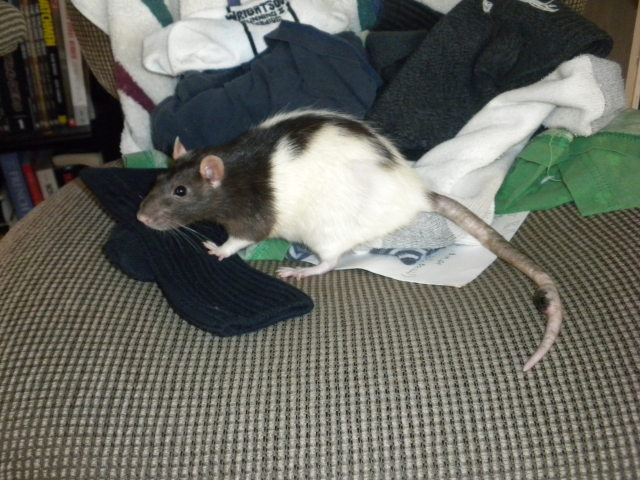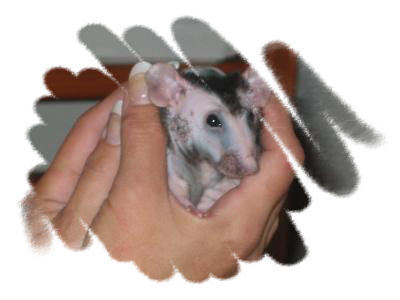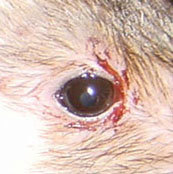QuestionI just had to put down my beloved, Sam, yesterday after a long battle with various respiratory problems(involving costly antibiotic treatments and the works). I lost his cagemate about 8 months ago to pneumonia despite a series of antibiotic shots and a full course of baytril (30 days). I'm just devastated after losing Sam and i'm trying to prepare myself for when i'm ready for new ratties. Both my boys were bought at a pet store, which i will be avoiding like the plague this time around. Is there anything else i can do to minimize their risk of respiratory illness besides the obvious? are there specific things i should look for when selecting a breeder? I know it's hit or miss when talking about longevity, but I just need to know that I can take all precautions available when looking next time. I lost Ben after a year and a half and Sam was only almost 2 1/2. it was just too soon.
AnswerHi Jennifer
I am really sorry you lost your little men to myco related illnesses. Its just not fair and they already have short life spans as it is let alone the fact we have to deal with an organism they are born with.
Ever since I started working with rats, I have learned to despise the word MYCO. It is, as you know, something that every educated rat owner has learned to fear and our heart drops when we hear that word.
Obviously you are already aware of the fact myco can be triggered by many things, from a cage with too much ammonia build up from urine,smoke, even air freshener sprayed innocently in the room, pine or cedar bedding due to the phenol oils, genetic (which is why you plan on finding a good breeder!) and the newest findings include vitamin A or E deficiency, which is something that can be fixed by adding these supplements to the diet.
The problem is, the vets all assume that myco is just something we have to accept and that all respiratory infections stem from the mycoplasma organism but the real problem with myco is that it is actually LESS dangerous than the secondary infections that it opens the door to by making the rats immune system weaker. Most vets know to use baytril because myco has no cell wall and most antibioitcs are made to fight the cell wall but when an organism doesnt have a cell wall, the antibiotic is no better than giving your rat water in a syringe. Myco, zithromax and doxycycline are the very few drugs that work on an organism with no cell wall, but the truth is, it has been used so much that it may make the rat become tolerant to these few drugs and they wont work on myco when needed. As I said earlier, the most dangerous part of myco is the secondary infection that myco can trigger which is, as you have found, pneumonia for starters, which, if the rat does survive, can leave the rat with lung scarring and even just with a few respiratory infections that are myco related, the rats lungs end up with scarring, blisters and this can set off long term lung disease such as emphysema. Many of our rats have emphysema and rat owners think its myco but its not. It WAS from myco, mind you, but now your rat has chronic lung disease thanks or should I say NO thanks to myco. The rat may be short of breath, breathe with his or her mouth open, have chronic congestion etc..etc...and the worst part is, when the lungs become infected and put a strain on the heart, eventually heart disease sets in. Lung disease goes hand in hand with heart disease.
Oh, almost forgot (which again, this may be old news to you since you seem educated about myco and sadly have lost two beloved "fuzzbutts" to the nasty infection too! :(
Myco is also responsible for causing uterine infection in intact females, urinary tract infection and also inner ear infection. Happy happy joy joy huh!? A real nuisance actually!!
Anyhow, you asked how to handle myco aside from the obvious with, I am assuming the obvious is to steer clear of pet store rats
and I want to explain this to other readers that may be scratching their heads saying "well gee, ALL rats carry myco so why pick on pet store rats?!" This is a good question but I think my answer will shed some light. Pet store rats as many people know are NOT bred for health. It wouldnt be fair to say that this held true for ALL pet store rats because there are some believe it or not, (this includes big chains such as Petco and Petsmart too!) do take pride in their rats they sell to pet stores and some petstores really do care about the quality of pet rats they sell. In fact, one Petco in my area gets rats from two different breeders and they keep the sexes separate and the breeder has actual HISTORY kept on the parents and grandparents of these rats etc...but this is not always the case, unfortunately, and it SHOULD be!
So these pet store rats have already been exposed to not just myco, but secondary infections as well, which I said earlier, are more dangerous and worrisome than myco alone.
This is when Quarantine comes in and has an important role to play regardless where you buy the rats. 3 weeks in a totally different airpspace is what is warranted but not also feasible. Keep the new rats in the other part of the house, shut off vents to that room and take precautions yourself when going between new rat and existing rat, this is fine. THe germs wont go from room to room but instead they travel on YOU. If you want you can read up on proper procedures on my website:
http://www.freewebs.com/crittercity/thequarantinepage.htm
So how to really get ahold of myco? The best way is to treat both myco and a secondary infection focusing on the secondary infection the most since this is what triggers dangerous and damaging pneumonia. The way to treat this is to use both amoxil and baytril or Cefa drops and baytril. I prefer Cefa and rats LOVE the orange taste.
Usually after the first attack, (here is where the controversy is) the rat should be placed on a once a day dose of baytril or zithromax the rest of his life. Rat lovers that are experienced in rat care but have no medical background will argue that doing this will cause the rat to become tolerant to the baytril but what they are not understanding is the secondary infection caused by myco is the one to worry about as I said a few times already (I hate to sound like a broken record, sorry) and there are plenty of other drugs rather than baytril to use. However, rarely is tolerance seen when used this way and there are more success stories than there are failures when done this way. It should be done after the first respiratory infection, be it the sniffles that was brought on by myco or a full blown case of pneumonia. The first out break leaves the rat very vulnerable to a second attack if he is not protected.
I think I have blabbed enough for now about myco...
You asked about breeders and how to find a good one? You can type in the search engine RAT BREEDERS and usually tons of lists pop up.
THe best thing to do is make sure the breeder has references and allows you to come in to see the rattery. Note how cautious the breeder is about you entering the rattery and note if they ask you to remove shoes and wash hands etc...since viruses such as SDA can come in right on your shoes. You never know what someone elses rat may have and you can carry it to the other rats. Some germs remain on your own body and clothes and even in the lining of your nostrils for up to 3 hours if they are airborne so if the breeder is cautious about germs, your off to a good start. You can tell how clean the breeder is and note the way she keeps the rats and the cages and if they are clean etc...
The rats diet should be low protein and low fats and she should be very knowledgeable about nutrition, husbandry and some rat illnesses. I dont expect a breeder to know everything from A to Z about rat ailments but the more common ones, yes, they should know about them and also know the history of the rats blood line. Aggression should never be an issue. Tumors such as mammary and pituatry tumors cannot be expected to be bred OUT because they stem from estrogen levels that are high after menopause and without spaying the female at a young age, she will be prone to them regardless of how she is bred.
However, there are some cancerous tumors that if they are noted in a line, the line should be stopped. Same for megacolon and several others too. Aggressive rats should be noted and the lines stopped.
I bought four beautiful boys last Feb from a reputable breeder, so I thought. Turns out she was referred to me by her friends and not real customers so of course they will say good things. I was mislead into thinking that these people were random customers. She lived in another state and I had no way to inspect her rattery although she had a nice website with photos etc...
I had no breeders locally to buy from or I would have stayed local.
Anyhow, the day I brought them home, one boy had a huge tumor on his chest she claimed was scar tissue from an abscess and said her vet told her that. SHe was not aware of the fact I knew more about rats than probably her vet (and if the vet really said that it was scar tissue, yeah, I know much more than he does because it was not scar tissue and if it was, it sure formed awfully fast! LOL) so I had to pay for surgery on the male the first week I had him....PLUS the boy with the tumor on his chest and his cute brother were so aggressive they attacked each other and me and the other two rats (same breeder, different litter) they were 4.5 months old when I bought them. I had to have the two boys neutered so I had it all done the second day I had them...tumor removed and two males neutered. Price: $400
I was mad and did not pay her for the four rats. I never sent the check and she actually expected me to pay her? She was sadly mistaken!
Now, the rat with the tumor has died (he was 15 months) the second aggressive rat is blind in both eyes and the two black boys are ok, knock on wood) but long story short, it was MY fault for not going local and being able to get real references and inspect her rattery in person.
I know some breeders (good ones, I promse! LOL) if you let me know where your located I can try to find a few names for you.
So after this blabbing I hope I have helped shed some light on myco and other things. Let me know how else I can help...just ask.
regards
Sandra

 Rat behaviors.
Question
Cricket Playing
A little background: Al
Rat behaviors.
Question
Cricket Playing
A little background: Al
 Large lump on tail
Question
Lump on Swiffers Tail
My rat Swiffer has a lum
Large lump on tail
Question
Lump on Swiffers Tail
My rat Swiffer has a lum
 Time to put the rat down?
QuestionQUESTION: Hello Sandra,
I am the one with the r
Time to put the rat down?
QuestionQUESTION: Hello Sandra,
I am the one with the r
 Bloody eyes in my pet rat...
QuestionMy cousins pet rat is about three years old and
Bloody eyes in my pet rat...
QuestionMy cousins pet rat is about three years old and
 Pet rat is acting differently, could she have arthritis?
QuestionHavarti
QUESTION: Dear Sandra,
About tw
Pet rat is acting differently, could she have arthritis?
QuestionHavarti
QUESTION: Dear Sandra,
About tw